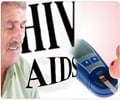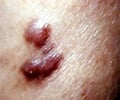According to researchers treatment as soon as HIV infection has been identified may be enough to functionally cure about a 10th of those diagnosed early.

The group of patients, known as the Visconti cohort, all started treatment within 10 weeks of being infected. They were given a course of antiretroviral drugs for three years, on average, but then stopped.
The drugs keep the virus only in check, but cannot eradicate it from its hiding places inside the immune system, the researchers said.
Normally, when the drugs stop, the virus bounces back. This has not happened in the Visconti patients and some have been able to control HIV levels for a decade.
Recently it was also reported that a baby girl has been effectively cured after very early treatment in the US.
Dr Asier Saez-Cirion, from the Institute Pasteur in Paris said theta most individuals who follow the same treatment will not control the infection, but there are a few of them who will.
Advertisement
"They still have HIV, it is not eradication of HIV, it is a kind of remission of the infection," he stated.
Advertisement
However, they said it was "unclear" why only some patients were functionally cured.
Dr Andrew Freedman, a reader in infectious diseases at Cardiff University School of Medicine, said the findings were "certainly interesting".
However, he cautioned that many patients would be diagnosed much later than in this study.
Source-ANI















